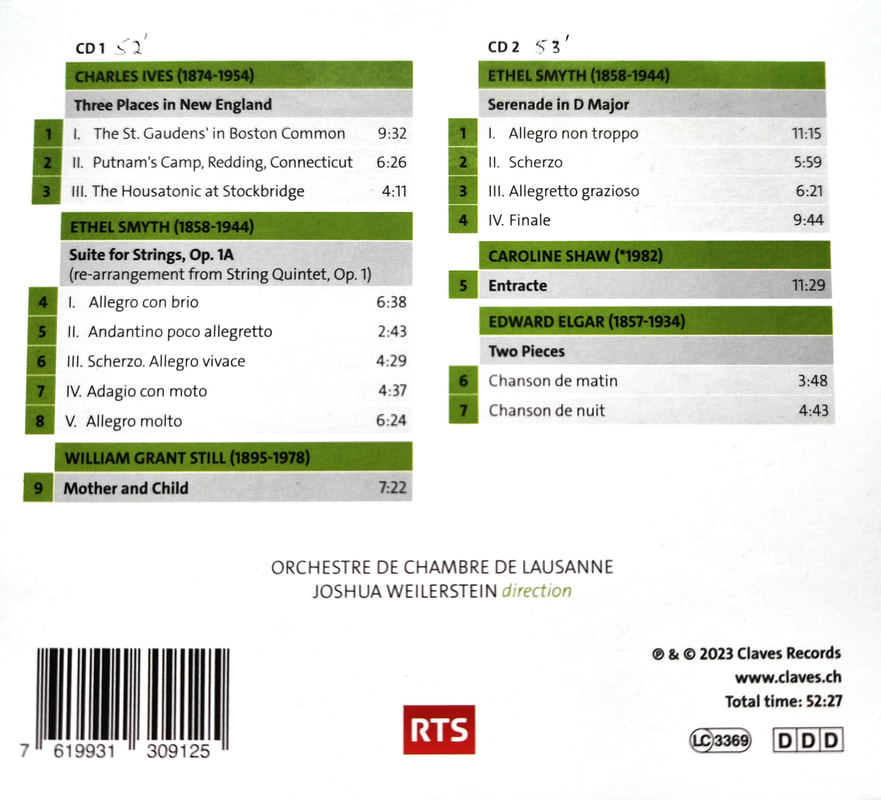Happily, Weilerstein sounds more comfortable with the lighter, easier fare on this new collection, and his orchestra gets through it without too much effort from the podium. I know that sounds like faint praise, and I suppose it is. But while there are some good things here, there is really nothing particularly remarkable or outstanding – musically or interpretatively.
CD 1 starts off with one of Charles Ives’ most well-known works from 1914, Three Places in New England (also known as Orchestral Set #1.) It is fairly well characterized and rather nicely done here, if not notably so. There are surprisingly few outstanding recordings of this work one could turn to – Slatkin/RCA, Tilson Thomas/DG and RCA, Dohnanyi/Decca – and those are surely getting to be considered “vintage” at this point. However, a quick comparison with Tilson Thomas’ 1999 San Francisco remake for RCA instantly displays a more dynamic, atmospheric and powerful immersion into this music compared to the more leisurely Weilerstein. However, the Claves recording is excellent, featuring a potent bass drum in the second movement which is really quite arresting.
Concluding Disc 1 is undoubtedly the highlight of the entire program, William Grant Still’s achingly heartfelt Mother and Child. This was originally the second movement of his 1943 Suite for Violin and Piano, which Still later arranged for string orchestra. It is gorgeously played here, showing Weilerstein at his most inspired.
Turning to English composers, Ethel Smyth’s Suite for Strings is sandwiched in between the two American works on Disc 1. It is an arrangement of her early (Opus 1) String Quintet, written in 1884. Cast in 5 contrasting movements, it is smiling and pleasantly tuneful, though made to sound rather lightweight in Weilerstein’s hands. The opening Allegro is gentle rather con brio, as indicated, and the final allegro is not terribly molto. The Scherzo comes off best, other than a peculiar, closely-mic’d and queasy-sounding violin solo in its central section, which was just plain weird, actually.
The strings sound a bit undernourished in this piece, perhaps in an attempt to retain some of the intimacy of the original.
Smyth’s Serenade in D Major on Disc 2 is better, heavily laden with the songful expressiveness of Brahms. The first and fourth movements tend to weigh themselves down rather too much with his influence, but the central sections are lighter and rather delightful. It’s an enjoyable piece, just not really uniquely her own. And Weilerstein doesn’t help in this regard, content to let it wallow in Brahmsian glow. In the end, it merely succeeded in making me want to listen to some good Brahms, so I’m not entirely sure that’s a good thing or not.
Keeping with CD2, Two Pieces by Edward Elgar round off the concert. These chansons are certainly the most musically accomplished compositions of the entire program, and their songful melodies and richly textured accompanying harmonies are wonderfully endearing. Elgar’s connection with the program, other than being an exact contemporary of Ethel Smyth, is that these Two Pieces were written the same year as her Serenade (1889).
Meanwhile, sandwiched in between these two very traditionally Romantic, English works is the oddity of the program (made more so by the placement of it) – Caroline Shaw’s contemporary and very modern Entracte (sic). Her Entr’acte is a great piece and has been recorded often, but I’m baffled why such an ultra-modern work was chosen to be included here; it sounds distinctly out of place in this company. It was written in 2011, originally for string quartet, and Weilerstein plays the subsequent arrangement for string orchestra. I generally prefer the original for its transparency, clarity of textures and freer, more intimate emotional expression. But it can be successful with more players (the United Strings of Europe certainly make the most of it on their 2021 recording for BIS). However, it sounds just a bit thick and matter-of-fact as played here by the Lausanne Chamber Orchestra. I miss some of the endless variety of texture, color and atmosphere of the best performances. I suspect Weilerstein is asking for long-bows when a little more off-the-string lightness and precision of articulation would have been very beneficial. (Curiously that was a major problem I heard with his earlier Stravinsky – listless, inarticulate bowing from the strings.)
All in all, these are pleasant, if not distinctive readings of an unusual program which is perhaps slightly illogical, but certainly unique. In the end, I couldn’t get past feeling this program couldn’t quite decide what it wanted to be. We have such an odd combination of composers on offer – 2 female, 1 African-American, 1 very contemporary/abstract, while all the rest are resolutely late-19th- to mid-20th-Century, plus a little Elgar thrown in at the end. I think the layout of the program might have been improved by presenting the American works on one disc and the British ones on the other. But that’s just me.
As to the production, there is a comprehensive booklet with personal program notes provided by our conductor, and the attractive, foldout cardboard enclosure is impressive. However, surely a couple more pieces should have been included on this set, as we have two distinctly underfilled CDs lasting just 52 minutes each, leaving us a bit short-changed.











